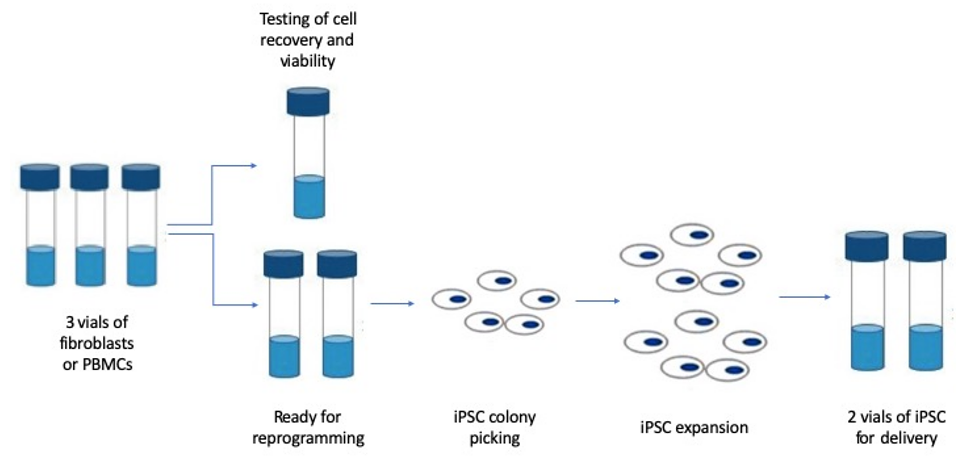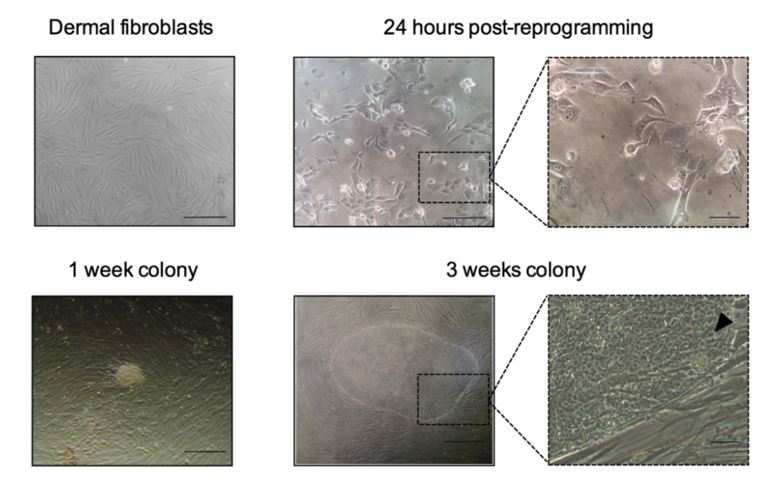- You are here: Home
- Services
- Stem Cell Research
- iPSC Generation
Services
-
Cell Services
- Cell Line Authentication
- Cell Surface Marker Validation Service
-
Cell Line Testing and Assays
- Toxicology Assay
- Drug-Resistant Cell Models
- Cell Viability Assays
- Cell Proliferation Assays
- Cell Migration Assays
- Soft Agar Colony Formation Assay Service
- SRB Assay
- Cell Apoptosis Assays
- Cell Cycle Assays
- Cell Angiogenesis Assays
- DNA/RNA Extraction
- Custom Cell & Tissue Lysate Service
- Cellular Phosphorylation Assays
- Stability Testing
- Sterility Testing
- Endotoxin Detection and Removal
- Phagocytosis Assays
- Cell-Based Screening and Profiling Services
- 3D-Based Services
- Custom Cell Services
- Cell-based LNP Evaluation
-
Stem Cell Research
- iPSC Generation
- iPSC Characterization
-
iPSC Differentiation
- Neural Stem Cells Differentiation Service from iPSC
- Astrocyte Differentiation Service from iPSC
- Retinal Pigment Epithelium (RPE) Differentiation Service from iPSC
- Cardiomyocyte Differentiation Service from iPSC
- T Cell, NK Cell Differentiation Service from iPSC
- Hepatocyte Differentiation Service from iPSC
- Beta Cell Differentiation Service from iPSC
- Brain Organoid Differentiation Service from iPSC
- Cardiac Organoid Differentiation Service from iPSC
- Kidney Organoid Differentiation Service from iPSC
- GABAnergic Neuron Differentiation Service from iPSC
- Undifferentiated iPSC Detection
- iPSC Gene Editing
- iPSC Expanding Service
- MSC Services
- Stem Cell Assay Development and Screening
- Cell Immortalization
-
ISH/FISH Services
- In Situ Hybridization (ISH) & RNAscope Service
- Fluorescent In Situ Hybridization
- FISH Probe Design, Synthesis and Testing Service
-
FISH Applications
- Multicolor FISH (M-FISH) Analysis
- Chromosome Analysis of ES and iPS Cells
- RNA FISH in Plant Service
- Mouse Model and PDX Analysis (FISH)
- Cell Transplantation Analysis (FISH)
- In Situ Detection of CAR-T Cells & Oncolytic Viruses
- CAR-T/CAR-NK Target Assessment Service (ISH)
- ImmunoFISH Analysis (FISH+IHC)
- Splice Variant Analysis (FISH)
- Telomere Length Analysis (Q-FISH)
- Telomere Length Analysis (qPCR assay)
- FISH Analysis of Microorganisms
- Neoplasms FISH Analysis
- CARD-FISH for Environmental Microorganisms (FISH)
- FISH Quality Control Services
- QuantiGene Plex Assay
- Circulating Tumor Cell (CTC) FISH
- mtRNA Analysis (FISH)
- In Situ Detection of Chemokines/Cytokines
- In Situ Detection of Virus
- Transgene Mapping (FISH)
- Transgene Mapping (Locus Amplification & Sequencing)
- Stable Cell Line Genetic Stability Testing
- Genetic Stability Testing (Locus Amplification & Sequencing + ddPCR)
- Clonality Analysis Service (FISH)
- Karyotyping (G-banded) Service
- Animal Chromosome Analysis (G-banded) Service
- I-FISH Service
- AAV Biodistribution Analysis (RNA ISH)
- Molecular Karyotyping (aCGH)
- Droplet Digital PCR (ddPCR) Service
- Digital ISH Image Quantification and Statistical Analysis
- SCE (Sister Chromatid Exchange) Analysis
- Biosample Services
- Histology Services
- Exosome Research Services
- In Vitro DMPK Services
-
In Vivo DMPK Services
- Pharmacokinetic and Toxicokinetic
- PK/PD Biomarker Analysis
- Bioavailability and Bioequivalence
- Bioanalytical Package
- Metabolite Profiling and Identification
- In Vivo Toxicity Study
- Mass Balance, Excretion and Expired Air Collection
- Administration Routes and Biofluid Sampling
- Quantitative Tissue Distribution
- Target Tissue Exposure
- In Vivo Blood-Brain-Barrier Assay
- Drug Toxicity Services
iPSC Generation
Compared to primary culture, iPSC-derived cells are amenable to genome editing/engineering and direct control over genetic diversity with the unlimited proliferation potential. Additionally, iPSC derived from peripheral blood or skin fibroblasts can be differentiated into certain cell types which are hard to collect directly from the donors, such as cardiomyocytes, cortical neurons, pancreatic beta cells, etc.
Creative Bioarray is dedicated to providing several viable and cost-effective methods for pluripotent stem cells (iPSC) generation. We employ advanced iPSC reprogramming factor delivery by episomal vectors, viral vectors, as well as other iPSC reprogramming methods (mRNA, protein and chemical reprogramming) to help you obtaining the desired iPSC.
Creative Bioarray offers iPSC generation service:
- Almost 100% rate of reprogramming by optimized protocols
- The passage ratio of iPSC is around 1:15~20, which allows to establish a large amount of cell bank
- Generated from healthy or diseased samples
- From skin fibroblasts, PBMCs, CD34+ cord blood, LCLs, hair follicles and more starting cell samples
- Viable and various Integration-free and feeder-free approaches
- Free characterization assays included, such as ICC, Karyotyping (G-banding), Teratoma Formation assay, RT-PCR for pluripotent gene expression, TaqMan hiPSC Scorecard Assay. Each of these services will be provided with a comprehensive report suitable for publications.
 Figure 1. iPSC Generation service workflow at Creative Bioarray.
Figure 1. iPSC Generation service workflow at Creative Bioarray.
Workflow of iPSC Generation service:
- Recovery, passaging, initial testing and banking of donor cells
- Cell reprogramming with non-integrating, zero-footprint systems
- iPSC colony picking, expansion, and cryopreservation
- iPSC Characterization assays
- Established iPSCs QC tests before release
Samples required: 2-3 vials, 10^6 cells/vial
Deliverables:
- 2 iPSC clones with 2 vials per clone at 10^6 cells/vial
- Project report
Once you receive the iPSCs from us, our dedicated specialists will share their expertise and provide ongoing support to help ease the adaptation of the cells into your experimental systems.
 Figure 2. Example of iPSC reprogramming. Phase contrast images taken after reprogramming, showing the morphological changes occurred after transduction.
Figure 2. Example of iPSC reprogramming. Phase contrast images taken after reprogramming, showing the morphological changes occurred after transduction.
Creative Bioarray is an experienced and outstanding provider of iPSC Generation service. We are dedicated to providing quality data and comprehensive service for your scientific research, and we are pleased to use our extensive experience and advanced platform to offer the best service to satisfy each demand from our customers.
If you have any special need in iPSC Generation service, do not hesitate to contact us for this special service. Please let us know what you need and we will accommodate you. We are looking forward to working with you in the future.
References
- Takahashi, et al. "Induction of pluripotent stem cells from mouse embryonic and adult fibroblast cultures by defined factors." cell 126.4 (2006): 663-676.
- Csöbönyeiová, et al. "Toxicity testing and drug screening using iPSC-derived hepatocytes, cardiomyocytes, and neural cells." Canadian journal of physiology and pharmacology 94.7 (2016): 687-694.
Explore Other Options
For research use only. Not for any other purpose.

